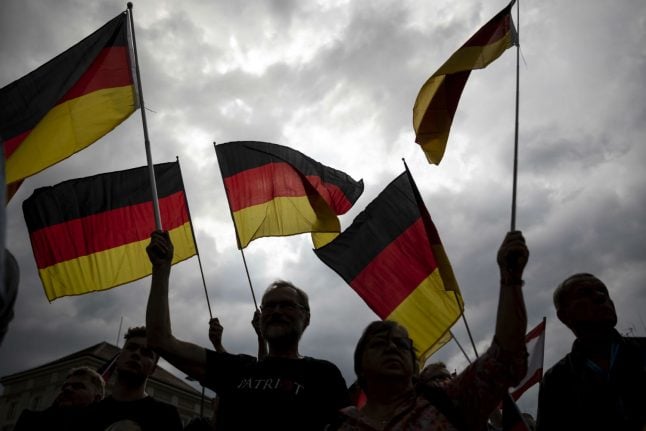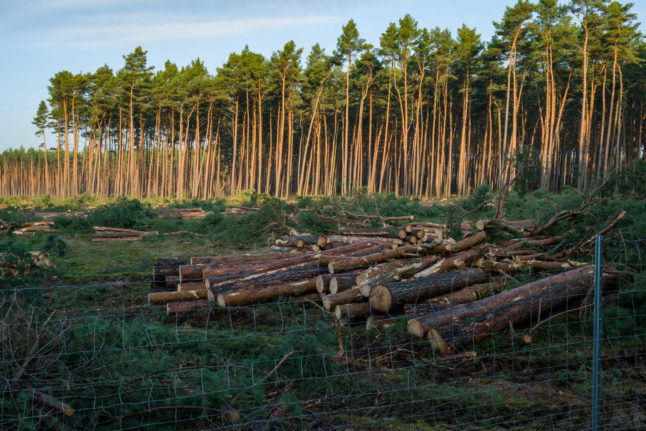“We're dying here and no-one is listening to us,” says Heidemarie Liebo, a retired woman from Heinersbrück, an eastern German village hit by depopulation and despair.
The community of 600 people in southern Brandenburg state near the Polish border is adjacent to one of the region's biggest job providers, the coal-fired power plant Jänschwalde.
Yet it hardly benefits from the economic spin-offs from the plant, which at any rate is set to close by 2038 as Germany seeks to reduce its carbon emissions and meet its climate goals.
READ ALSO: Eco campaigners blockage German coal mine
The locals are worried about the future, many feel ignored, and they are turning their backs on Chancellor Angela Merkel's Christian Democrats and the other mainstream parties.

Heinersbrück plant operator Dietmar Piesker in 2015. Photo: DPA
While the share of foreign-born residents in the region, at less than five percent, is among the lowest in Germany, the vote for the anti-immigration far right has exploded in the village.
Nearly 40 percent here chose the Alternative for Germany (AfD) during the 2017 legislative elections, when it became the biggest opposition party in the German parliament.
READ ALSO: Far-right AfD becomes 'strongest force in state of Brandenburg' for first time
And for many residents regional elections on September 1st in Brandenburg, as well as in neighbouring Saxony, will be another opportunity to register their protest.
End looms for coal plant
“We have no foreigners here, and no racism problems,” Horst Nattke, mayor of Heinersbrück and a retired coal plant worker, tells AFP in the dilapidated community hall.
In his town, the school, supermarket, bakery, local history museum and weekly consultation hours of the country doctor have all disappeared.
A new bicycle path, which would allow villagers to avoid the national highway when they go shopping in the nearest city, has been talked about for 25 years but not materialized.
And the planned closure of the coal plant fans deeper fears about jobs and prosperity.
“What will we be offered in its place?” Nattke asks.
Liebo, head of an elderly citizens association, lists other grievances, such as poor mobile phone reception.
In distant Berlin, “they want to develop 5G, but we still don't even have a network!,” she exclaims.
“They are driving e-scooters, we have to stop driving diesel cars. But without a car, how do we do it?
“We don't see any alternative, we tell ourselves that we have to try something else.”
'Incomplete' reunification
Resentment towards established parties is one of the main drivers of extremist voting, particularly in Germany's east, says sociologist David Begrich.
“Many AfD voters do not have an extreme right-wing view of the world but draw on particular points from the party's electoral promises, including anti-establishment rhetoric,” he says.

AfD protesters in Brandenburg's Cottbus on August 4th with a sign reading “The AfD is the only hope in madhouse Germany.” Photo: DPA
“This resentment against 'those up there', the elite, pleases people in the east.”
Aside from railing against immigrants, the AfD seeks to mobilize previous non-voters with promises of citizen participation, improving local public services and raising the minimum wage.
In the former East Germany, “many consider themselves second-class citizens,” says Begrich.
READ ALSO: 'Tearing itself apart': New rift in far-right AfD ahead of east German polls
Thirty years after the fall of the Berlin Wall, a political and social gap continues to divide the country.
In the east, the average monthly income is €533 lower than in the west, with an unemployment rate exceeding six percent compared to less than five percent in the west.
Much of the resentment focuses on the “Treuhandanstalt”, or trust agency, which privatized state enterprises and applied shock therapy to end to the planned economy of the communist GDR.
Within a few years, about 13,000 companies were sold and millions of people left unemployed.
Two years after German reunification, industrial production in the east had plummeted by 73 percent from 1989 levels.
The agency was the spearhead of “economic and social destruction” and led “many people into anguish”, says Thomas Kliche, a political psychologist at Magdeburg-Stendal University.
This rupture, “mixed with anger and despair, is a fertile breeding ground for populism”.




 Please whitelist us to continue reading.
Please whitelist us to continue reading.
Member comments